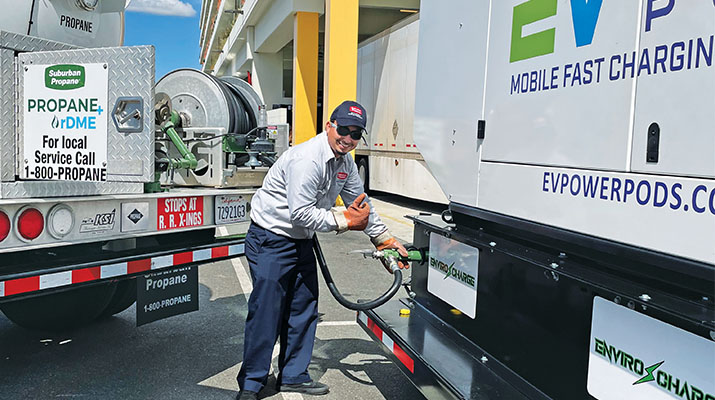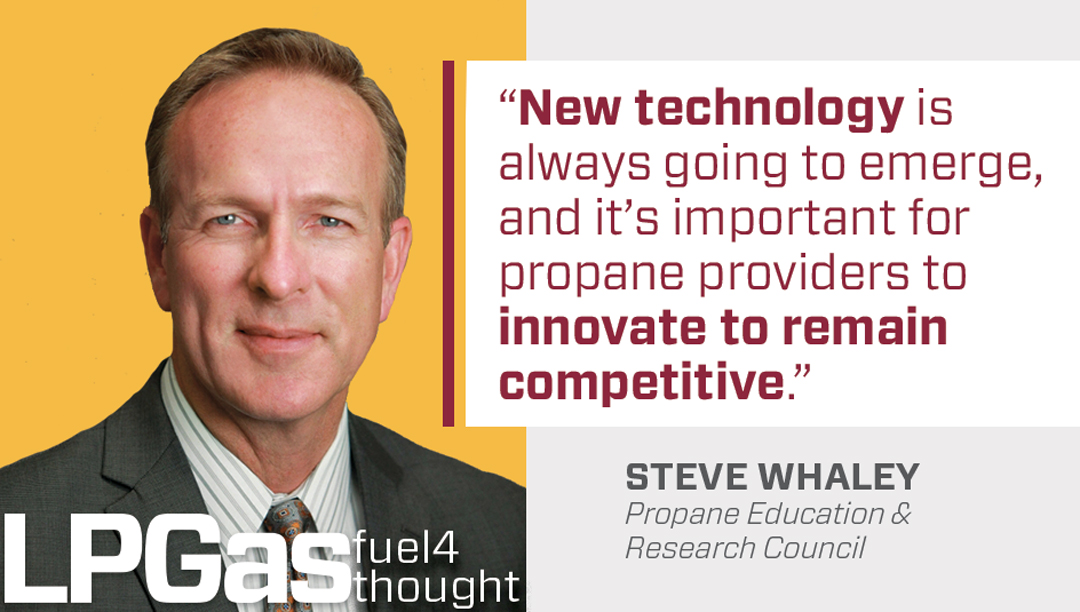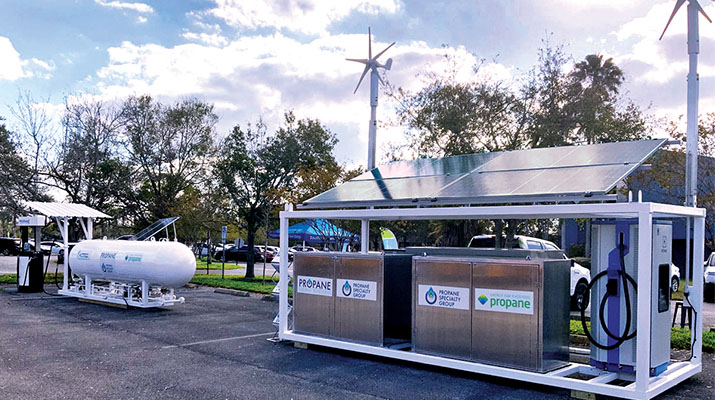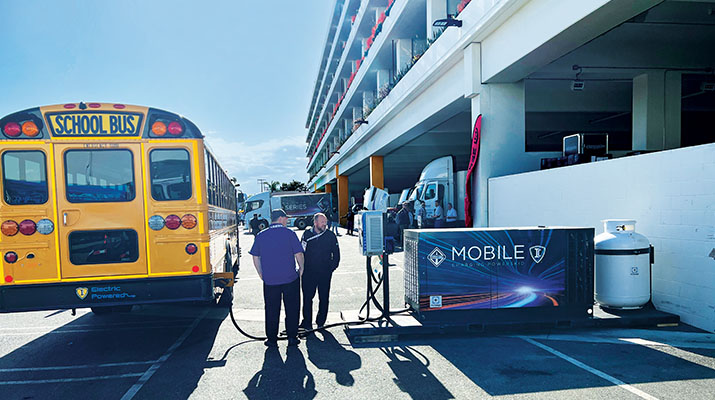Propane meets energy needs amid electric vehicle transition

Propane-powered EV charging offers “an untapped market space” for the propane industry, according to leaders at EV Power Pods. (Photo courtesy of PERC)
As Steve Whaley, director of autogas business development for the Propane Education & Research Council, reflects on the past few decades, he believes propane “has earned a reputation as the reliable energy source.”

Whaley
Whenever new energy innovations and technologies have emerged, propane has steadily remained the primary energy source. Consequently, while some propane industry members believe electric vehicles (EVs) are competitors to autogas, Whaley views them in an entirely different light.
“While EVs continue to become more popular, the propane industry has another opportunity to demonstrate propane’s reliability as an energy source for recharging,” he says.
At first, some propane industry members were concerned that the EV industry would minimize propane autogas’s role, with regards to clean transportation, according to Whaley. But, as stationary and mobile propane-powered charging systems have been released, propane marketers are realizing that several opportunities are available. In particular, they’ll be able to maximize their gallons by providing EV charging solutions.
“Instead of viewing EVs as competition, propane providers should view them as opportunities to grow their businesses and support their communities,” Whaley emphasizes. “New technology is always going to emerge, and it’s important for propane providers to innovate to remain competitive.”
Of equal importance, according to Whaley, EVs that utilize propane-powered rechargers require nearly the same number of gallons as a propane autogas vehicle.
“The bottom line? Providers aren’t losing out on money if they service either a propane autogas vehicle or a propane-charged EV,” he adds.
In preparation for the future of EVs, the following three companies aren’t only fully embracing EV technology – they’re creating innovations that ensure EVs can be recharged independently of the electric grid, via propane-powered EV recharging systems.

Propane Fueling Solutions
Knowing “innovation drives progress,” Propane Fueling Solutions has created a “new standard for EV charging,” according to coordinator Andrea Rivera.

Rivera
A portable, dual-purpose, standalone fueling system, the “new standard” is not only providing the EV industry a charging solution that’s been necessary for years, but it’s also “paving the way for a sustainable, cost-effective and reliable future.”
Utilizing amalgamation, which creates a nanogrid, the modular system integrates renewable energy sources like wind and solar power – boosted by a propane generator – to create electricity. It harnesses and stores clean energy, as it uses an integrated battery system that has a 30-kW storage capacity. Each system uses a stack of six 5-kW batteries at a time.
Able to charge at various speeds, as its capabilities range from 20 kW to 175 kW, the system can charge a wide array of vehicles in all 48 continental states, from electric and propane school buses to electric and propane vehicles.
“Using propane as its fuel source, the system’s generator is utilized to charge a variety of EVs’ batteries,” Rivera says. “And it features a built-in electronic register, coupled with a cloud-based fuel management system, enabling efficient, seamless processes.”
Varying according to its particular generator’s size and capacity, each system consumes roughly three to 30 gallons of propane on an hourly basis. In addition, the system typically uses propane tanks with a 1,000-gallon capacity, which can fluctuate according to users’ needs.
While utilizing propane, the system’s users will be completely freed from the power grid, as they’re able to generate their own energy without having to worry about charging interruptions.
“Propane marketers – such as our recent partners, ThompsonGas and Thompson AutoGas – are in a prime position to make the most of our system’s benefits, as it allows them to bring innovative solutions to their customers while also broadening their range of services,” she states.
“And, since the system uses renewable energy sources, complemented by propane’s clean-burning attributes, propane marketers’ customers will actively reduce their carbon footprints, thus contributing to a cleaner environment.”

The dual-purpose, standalone fueling system from Propane Fueling Solutions allows fleets to refuel with propane autogas or recharge using propane as the energy source. (Photo courtesy of Propane Fueling Solutions)
Pioneer eMobility
Pioneer eMobility’s e-Boost provides agnostic fast charging (Level 3) or Level 2 essential charging in several form factors. They range from containers (via its pod option) and skids (through its mini option), to trailers (via its mobile option) and trucks (through its “generator on a truck” or GOAT option).

Murickan
Since it’s grid independent, the solution doesn’t require electrical upgrades, extensive permitting processes or on-site construction.
With the ability to move from one location to another, especially as users’ EV charging needs and traffic patterns change, e-Boost ensures that facility leasing tenants and site owners aren’t paying for infrastructure work. Moreover, as they prepare to utilize EVs, they won’t have to wait for grid connections to be completed.
Ranging in power from 30 kW to more than 600 kW, the solution can also fulfill National Electric Vehicle Infrastructure (NEVI) market requirements, concerning four simultaneous 150-kW fast-charging units. Furthermore, it can be fueled with renewable propane and renewable dimethyl ether, enabling propane’s carbon intensity to become net zero, according to Geo Murickan, president and CEO of Pioneer eMobility.
“All of our units are powered by propane while utilizing electric generators,” he says. “They can run on renewable propane too without requiring any changes to any equipment.”
With its mobile features, the e-Boost enables users to ramp up on their charging needs from any location, including remote areas. In addition, it’s integrated with solar panels and battery energy storage, thereby supplying power for parasitic loads like remote monitoring.
Capable of charging an assortment of vehicles throughout the United States – ranging from school buses, heavy-duty trucks, passenger cars and whether they’re located at fleet depots, ports, school bus depots or other locations – the e-Boost can be used at charging stations along major highway corridors, too.
“The NEVI requirements demand 600-kW charging infrastructure across the United States’ highway corridors at every 50-mile interval,” Murickan explains. “Many of these locations are remote or not connected to the grid, leading e-Boost to become the only practical solution.”
Able to charge EVs for 24 hours of continuous usage, the e-Boost units are built with one 100-gallon propane tank (for the smaller units) or four, six or nine 100-gallon propane tanks (for the larger units).
“Standard installations require tanks to be refilled every three to four days,” Murickan adds. “So, dependent on the unit’s size and the user’s EV charging usage, anywhere from 160 to more than 1,500 gallons of propane need to be refueled every week, resulting in numerous sales opportunities for propane retailers nationwide.”

Pioneer eMobility’s e-Boost is versatile in the way it charges vehicles and the clean fuel on which it operates, including renewable propane and renewable dimethyl ether. (Photo courtesy of PERC)
EV Power Pods
According to the International Council on Clean Transportation, more than 3 million EVs are expected to be used in the United States by 2025. In addition, by 2030, at least 25 percent of all vehicles sold will be EVs. Created for this ever-increasing vehicle market, EV Power Pods are offered in three platforms: skid, trailer or truck mounted.

Beydler
Fueled by green energy alternative fuels, as designated by the U.S. Department of Energy, each EV Power Pod is completely grid independent. Mainly Level 3 DC fast chargers, EV Power Pods provide a variety of charging rates, ranging from 60 kW to 360 kW. Utilized in nearly every one of the lower 48 states, each of the offerings can use a standard CCS1 connector, along with CHAdeMO and Tesla adapters while charging buses, Class 8 vehicles, medium- and heavy-duty vehicles, and passenger vehicles.
“Propane is utilized to power the unit’s on-board power plant, which generates the level of electricity that’s used by its on-board DC fast charger,” says Dwain Beydler, founder and managing principal of EV Power Pods. “Each unit is designed to utilize standard green propane and renewable propane.”
The offering’s propane gallon usage varies from one unit to the next. For example, the 60-kW and 120-kW mobile DC fast chargers use up to 7 and 17.4 gallons per hour, respectively, whereas the 160-kW mobile DC fast charger utilizes up to 22.4 gallons per hour. Meanwhile, the 120-kW truck-mounted DC fast charger uses up to 16.5 gallons per hour. Each unit’s trailer has 115 gallons of onboard propane while also utilizing three tanks.
While preparing to provide EV Power Pods to more customers, Beydler believes EV charging opportunities are practically limitless for propane marketers seeking new avenues to growth.
“Propane-powered EV charging offers an untapped market space for the propane industry and positions it as a solution to ever-intensifying grid infrastructure concerns,” he notes. “Due to its vast availability throughout the United States, propane can be used for EV charging purposes anywhere in the country. And it offers users an economical and environmentally friendly option.”
Growth opportunity
More fleets will continue to transition to EVs in the coming months and years. The electric grid in the United States simply can’t handle the current influx demand, as the nation doesn’t have enough charging stations, according to Whaley.
“This leaves a major growth opportunity for propane retailers to step in with a drop-in recharging solution,” he says. “Fleet owners are under intense pressure to dramatically reduce emissions and are questioning how to best reach their goals. Propane provides an answer though, as it decreases emissions considerably.”
Whaley believes propane’s role with EV charging stations will be to offer reliability while also adding diversity to the overall energy mix.
“We’ve seen what can happen when all of our energy eggs are in one basket, as an electric grid failure or a pipeline cyberattack can render communities inoperable,” he adds.
“By adding propane into the energy mix to reliably charge EVs, drivers will have an additional layer of resiliency in order to keep America running.”
















